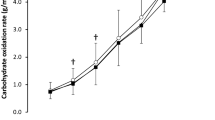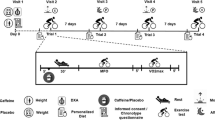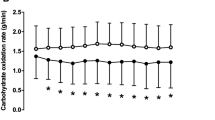Abstract
Purpose
Caffeine is a stimulant with well-recognized performance and metabolic benefits, however, there is a lack of studies investigating the time-of-day influence in the properties of caffeine to enhance fat oxidation in women. Thus, the aim of the present study was to evaluate the influence of the time of the day on the effect of caffeine on the maximal rate of fat oxidation during aerobic exercise in trained women.
Methods
Fourteen female athletes (25.5 ± 7.1 years) took part in a randomized, crossover, double-blind study. All participants undertook four different experimental trials combining the ingestion of 3 mg/kg caffeine and a placebo either in the morning (8.00–10.00 h) and in the evening (17.00–19.00 h) realizing an incremental test on a cycle ergometer with 3 min stages at workloads from 30 to 70% of maximal oxygen uptake (VO2max). Substrate oxidation rates were measured by indirect calorimetry. In each trial, the maximum rate of fat oxidation (MFO) and the intensity that elicited MFO (Fatmax) were measured.
Results
In comparison to placebo, MFO was significantly higher with caffeine both in the morning (0.24 ± 0.13 vs 0.30 ± 0.14 g/min; p < 0.001; ES = 0.79) and in the evening (0.21 ± 0.08 vs 0.28 ± 0.10 g/min; p = 0.002; ES = 0.72). No time-of-day effect on the capacity of caffeine to increase MFO was found (all p = 0.336)
Conclusion
The intake of 3 mg/kg of caffeine increased the use of fat as a fuel during exercise independently of the time-of-day in trained women.
Trial registration
The study was registered in ClinicalTrials.gov with the following ID: NCT05880186 by 15 May 2023.



Similar content being viewed by others
References
Aguilar-Navarro M, Munoz G, Salinero JJ, Munoz-Guerra J, Fernandez-Alvarez M, Plata MDM, Del Coso J (2019) Urine caffeine concentration in doping control samples from 2004 to 2015. Nutrients. https://doi.org/10.3390/nu11020286
Amaro-Gahete FJ, Jurado-Fasoli L, Trivino AR, Sanchez-Delgado G, De-la OA, Helge JW, Ruiz JR (2019) Diurnal variation of maximal fat-oxidation rate in trained male athletes. Int J Sports Physiol Perform 14(8):1140–1146. https://doi.org/10.1123/ijspp.2018-0854
Astorino TA, Terzi MN, Roberson DW, Burnett TR (2011) Effect of caffeine intake on pain perception during high-intensity exercise. Int J Sport Nutr Exerc Metab 21(1):27–32. https://doi.org/10.1123/ijsnem.21.1.27
Benowitz NL (1990) Clinical pharmacolly of caffeine. Ann Rev Med 41:277–288. https://doi.org/10.1146/annurev.me.41.020190.001425
Blaak E (2001) Gender differences in fat metabolism. Curr Opin Clin Nutr Metab Care 4(6):499–502. https://doi.org/10.1097/00075197-200111000-00006
Borg GA (1982) Psychophysical bases of perceived exertion. Med Sci Sports Exerc 14(5):377–381
Burke TM, Markwald RR, McHill AW, Chinoy ED, Snider JA, Bessman SC, Jung CM, O’Neill JS, Wright KPJR (2015) Effects of caffeine on the human circadian clock in vivo and in vitro. Sci Transl Med. https://doi.org/10.1126/scitranslmed.aac5125
Cano A, Ventura L, Martinez G, Cugusi L, Caria M, Deriu F (2022) Analysis of sex-based differences in energy substrate utilization during moderate-intensity aerobic exercise. Eur J Appl Physiol 122(1):29–70. https://doi.org/10.1007/s00421-021-04802-5
Chenevière X, Borrani F, Sangsue D, Gojanovic B, Malatesta D (2011) Gender differences in whole-body fat oxidation kinetics during exercise. Appl Physiol Nutr Metab 36(1):88–95. https://doi.org/10.1139/H10-08
Collado-Mateo D, Lavin-Perez AM, Merellano-Navarro E, Coso JD (2020) Effect of acute caffeine intake on the fat oxidation rate during exercise: a systematic review and meta-analysis. Nutrients. https://doi.org/10.3390/nu12123603
Darvakh H, Nikbakht M, Shakerian S, Mousavian A (2014) Effect of circadian rhythm on peak of maximal fat oxidation on non-athletic men. Zahedan Journal of Research in Medical Sciences: 8–11
de Souza JG, Del Coso J, Fonseca FS, Silva BVC, de Souza DB, da Silva Gianoni RL, Filip-Stachnik A, Serrao JC, Claudino JG (2022) Risk or benefit? Side effects of caffeine supplementation in sport: a systematic review. Eur J Nutr. https://doi.org/10.1007/s00394-022-02874-3
Domaszewski P, Pakosz P, Konieczny M, Bączkowicz D, Sadowska-Krępa E (2021) Caffeine-induced effects on human skeletal muscle contraction time and maximal displacement measured by tensiomyography. Nutrients. https://doi.org/10.3390/nu13030815
Dominguez R, Veiga-Herreros P, Sanchez-Oliver AJ, Montoya JJ, Ramos-Alvarez JJ, Miguel-Tobal F, Lago-Rodriguez A, Jodra P (2021) Acute effects of caffeine intake on psychological responses and high-intensity exercise performance. Int J Environ Res Public Health. https://doi.org/10.3390/ijerph18020584
Frandsen J, Dahl Vest S, Larsen S, Dela F, Helge JW (2017) Maximal fat oxidation is related to performance in an Ironman triathlon. Int J Sports Med 38(13):975–982. https://doi.org/10.1055/s-0043-117178
Frandsen J, Pistoljevic N, Quesada JP, Amaro-Gahete FJ, Ritz C, Larsen S, Dela F, Helge JW (2020) Menstrual cycle phase does not affect whole body peak fat oxidation rate during a graded exercise test. J Appl Physiol (1985) 128(3):681–687. https://doi.org/10.1152/japplphysiol.00774.2019
Frayn KN (1983) Calculation of substrate oxidation rates in vivo from gaseous exchange. J Appl Physiol Respir Environ Exerc Physiol 55(2):628–634. https://doi.org/10.1152/jappl.1983.55.2.628
Fredholm BB (1995) Adenosine, adenosine receptors and the actions of caffeine. Pharmacol Toxicol 76:93–101. https://doi.org/10.1111/j.1600-0773.1995.tb00111.x
Friedlander AL, Casazza GA, Horning MA, Huie MJ. Piacentini MF, Trimmer JK Brooks, GA (1998). Training-induced alterations of carbohydrate metabolism in women: women respond differently from men. J. Appl. Physiol. 85 (3): 1175–1186 https://doi.org/10.1152/jappl.1998.85.3.1175
Goncalves LS, Painelli VS, Yamaguchi G, Oliveira LF, Saunders B, da Silva RP, Maciel E, Artioli GG, Roschel H (2017) Dispelling the myth that habitual caffeine consumption influences the performance response to acute caffeine supplementation. J Appl Physiol 123(1):213–220. https://doi.org/10.1152/japplphysiol.00260.2017
Guest N, Corey P, Vescovi J, El-Sohemy A (2018) Caffeine, CYP1A2 genotype, and endurance performance in athletes. Med Sci Sports Exerc 50(8):1570–1578. https://doi.org/10.1249/MSS.0000000000001596
Guest N, VanDusseldorp TA, Nelson MT, Grgic J, Schoenfeld BJ, Jenkins NDM, Arent SM, Antonio J, Stout JR, Trexler ET, Smith-Ryan AE, Goldstein ER, Kalman DS, Campbell BI (2021) International society of sports nutrition position stand: caffeine and exercise performance. J Int Soc Sports Nutr 18(1):1. https://doi.org/10.1186/s12970-020-00383-4
Gutierrez-Hellin J, Del Coso J (2018) Effects of p-synephrine and caffeine ingestion on substrate oxidation during exercise. Med Sci Sports Exerc 50(9):1899–1906. https://doi.org/10.1249/MSS.0000000000001653
Gutiérrez-Hellín J, Aguilar-Navarro M, Ruiz-Moreno C, Muñoz A, Varillas-Delgado D, Amaro-Gahete FJ, Del Coso J (2023) Effect of caffeine intake on fat oxidation rate during exercise: is there a dose-response effect? Eur J Nutr 62(1):311–319. https://doi.org/10.1007/s00394-022-02988-8
Haddad M, Stylianides G, Djaoui L, Dellal A, Chamari K (2017) Session-RPE method for training load monitoring: validity, ecological usefulness, and influencing factors. Front Neurosci 11:612. https://doi.org/10.3389/fnins.2017.00612
Horne JA, Ostberg O (1976) A self-assessment questionnaire to determine morningness-eveningness in human circadian rhythms. Int J Chronobiol 4(2):97–110
Horton TJ, Pagliassotti MJ, Hobbs K, Hill JO (1998) Fuel metabolism in men and women during and after long-duration exercise. J Appl Physiol 85(5):1823–1832. https://doi.org/10.1152/jappl.1998.85.5.1823
Janse de Jonge XA (2003) Effects of the menstrual cycle on exercise performance. Sports Med 33(11):833–851. https://doi.org/10.2165/00007256-200333110-00004
Jeukendrup AE, Wallis GA (2005) Measurement of substrate oxidation during exercise by means of gas exchange measurements. Int J Sports Med 26(Suppl 1):S28-37. https://doi.org/10.1055/s-2004-830512
Jodra P, Lago-Rodriguez A, Sanchez-Oliver AJ, Lopez-Samanes A, Perez-Lopez A, Veiga-Herreros P, San Juan AF, Dominguez R (2020) Effects of caffeine supplementation on physical performance and mood dimensions in elite and trained-recreational athletes. J Int Soc Sports Nutr 17(1):2. https://doi.org/10.1186/s12970-019-0332-5
Kalmar JM, Cafarelli E (2004) Caffeine: a valuable tool to study central fatigue in humans. Exerc Sports Sci Rev. 32:143–147. https://doi.org/10.1097/00003677-200410000-00004
Maier T, Kühnel J, Zimmermann B (2022) How did you sleep tonight? The relevance of sleep quality and sleep-wake rhythm for procrastination at work. Front Psychol 12:785154. https://doi.org/10.3389/fpsyg.2021.785154
Marcheva B, Ramsey KM, Peek CB, Affinati A, Maury E, Bass J (2013) Circadian clocks and metabolism. In: Kramer A, Merrow M (eds) Circadian clocks. Handbook of experimental pharmacology, vol 217. Springer, Berlin, Heidelberg, pp 127–155. https://doi.org/10.1007/978-3-642-25950-0_6
Maunder E, Plews DJ, Kilding AE (2018) Contextualising maximal fat oxidation during exercise: determinants and normative values. Front Physiol 9:599. https://doi.org/10.3389/fphys.2018.00599
Pickel L, Sung HK (2020) Feeding rhythms and the circadian regulation of metabolism. Front Nutr 7:39. https://doi.org/10.3389/fnut.2020.00039
Ramirez-Maldonado M, Jurado-Fasoli L, Del Coso J, J RR, Amaro-Gahete FJ, (2021) Caffeine increases maximal fat oxidation during a graded exercise test: is there a diurnal variation? J Int Soc Sports Nutr 18 (1):5. doi:https://doi.org/10.1186/s12970-020-00400-6
Robles-Gonzalez L, Aguilar-Navarro M, Lopez-Samanes A, Ruiz-Moreno C, Munoz A, Varillas-Delgado D, Gutierrez-Hellin J, Helge JW, Ruiz JR, Amaro-Gahete FJ, (2022) No diurnal variation is present in maximal fat oxidation during exercise in young healthy women: A cross-over study. Eur J Sport Scihttps://doi.org/10.1080/17461391.2022.2067007
Robles-González L, Gutiérrez-Hellín J, Aguilar-Navarro M, Ruiz-Moreno C, Muñoz A, Del Coso J, Ruiz JR, Amaro-Gahete FJ (2021) Inter-day reliability of resting metabolic rate and maximal fat oxidation during exercise in healthy men using the Ergostik gas analyzer. Nutrients 13(12):4308. https://doi.org/10.3390/nu13124308
Roepstorff C, Steffensen CH, Madsen M, Stallknecht B, Kanstrup IL, Richter EA, Kiens B (2002) Gender differences in substrate utilization during submaximal exercise in endurance-trained subjects Am. J Physiol Endocrinol Metab 282(2):E435–E447. https://doi.org/10.1152/ajpendo.00266.2001
Ruíz-Moreno C, Lara B, Brito de Souza D, Gutiérrez-Hellín J, Romero-Moraleda B, Cuéllar-Rayo Á, Del Coso J (2020) Acute caffeine intake increases muscle oxygen saturation during a maximal incremental exercise test. Br J Clin Pharmacol 86(5):861–867. https://doi.org/10.1111/bcp.14189
Ruiz-Moreno C, Gutierrez-Hellin J, Amaro-Gahete FJ, Gonzalez-Garcia J, Giraldez-Costas V, Perez-Garcia V, Del Coso J (2021) Caffeine increases whole-body fat oxidation during 1 h of cycling at Fatmax. Eur J Nutr 60(4):2077–2085. https://doi.org/10.1007/s00394-020-02393-z
Salinero JJ, Lara B, Abian-Vicen J, Gonzalez-Millan C, Areces F, Gallo-Salazar C, Ruiz-Vicente D, Del Coso J (2014) The use of energy drinks in sport: perceived ergogenicity and side effects in male and female athletes. Br J Nutr 112(9):1494–1502. https://doi.org/10.1017/S0007114514002189
Smith A, Sutherland D, Christopher G (2005) Effects of repeated doses of caffeine on mood and performance of alert and fatigued volunteers. J Psychopharmacol 19(6):620–626. https://doi.org/10.1177/0269881105056534
Tate CA, Holtz RW (1998) Gender and fat metabolism during exercise: a review. Can J Appl Physiol 23(6):570–582. https://doi.org/10.1139/h98-032
Varillas-Delgado D, Aguilar-Navarro M, Muñoz A, López-Samanés A, Ruiz-Moreno C, Posada-Ayala M, Amaro-Gahete FJ, Del Coso J, Gutiérrez-Hellín J (2023) Effect of 3 and 6 mg/kg of caffeine on fat oxidation during exercise in healthy active females. Biol Sport 40(3):827–834. https://doi.org/10.5114/biolsport.2023.121321
Acknowledgements
The authors wish to thank the subjects for their invaluable contribution to the study.
Funding
This research was funded by Francisco de Vitoria University (grant number UFV-18/2020).
Author information
Authors and Affiliations
Contributions
MAN and JGH had the idea for the investigation, DVD, CRM, and ALS collected the research data, and all authors contributed to writing and/or critically revising the work. All authors read and approved the final manuscript.
Corresponding author
Ethics declarations
Conflict of interest
The authors declare no support from any organization for the submitted work; no financial relationships with any organizations that might have an interest in the submitted work in the previous 3 years; and no other relationships or activities that could appear to have influenced the submitted work.
Additional information
Communicated by Michael I Lindinger.
Publisher's Note
Springer Nature remains neutral with regard to jurisdictional claims in published maps and institutional affiliations.
Rights and permissions
Springer Nature or its licensor (e.g. a society or other partner) holds exclusive rights to this article under a publishing agreement with the author(s) or other rightsholder(s); author self-archiving of the accepted manuscript version of this article is solely governed by the terms of such publishing agreement and applicable law.
About this article
Cite this article
Muñoz, A., Aguilar-Navarro, M., Ruiz-Moreno, C. et al. Influence of the time of day in the effect of caffeine on maximal fat oxidation during exercise in women: a randomized, crossover, double-blind, and placebo-controlled study. Eur J Appl Physiol 124, 849–859 (2024). https://doi.org/10.1007/s00421-023-05312-2
Received:
Accepted:
Published:
Issue Date:
DOI: https://doi.org/10.1007/s00421-023-05312-2




